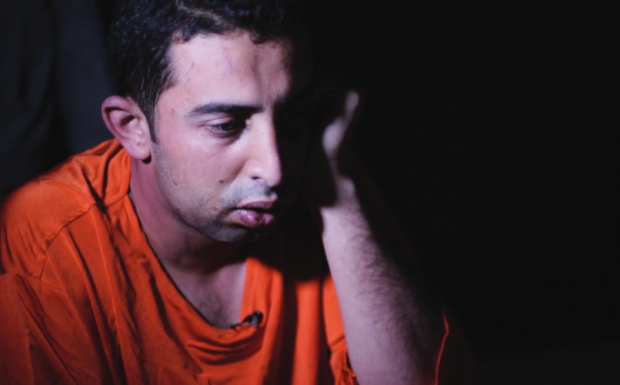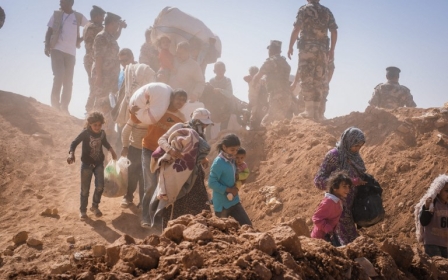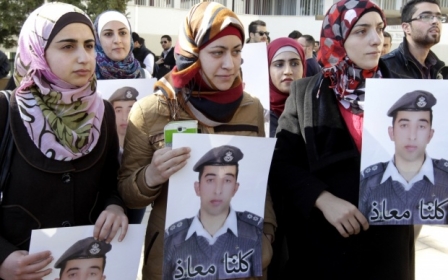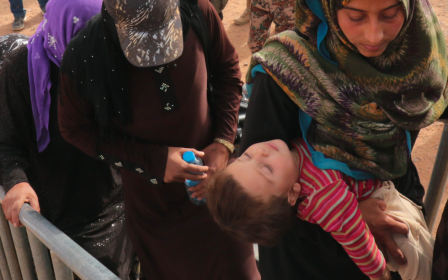A year after IS murder of Jordanian pilot, questions remain

AMMAN - A year after he watched his younger brother burn to death in a steel cage, Jawad al-Kasasbeh says he and his family are haunted by more than just memories of the young man he calls “the best of us”.
There are the phone calls from people claiming to have proof Jordanian Air Force pilot Muath al-Kasasbeh is alive, that his immolation at the hands of masked Islamic State (IS) militants on or around 3 January 2015 was just a hoax.
There are the videos, as recently as mid-December, where alleged former IS captives claim to have shared a cell with Kasasbeh long after he was killed. Although Jawad and his siblings don’t believe them, others do, and the questions and comments poke and prod the still-raw wounds of a family trying to accept a son’s unimaginably hellish death.
And then there are the knocks at the door, strangers disturbing a grieving family that was once at the centre of Jordanian consciousness, for favours from this or that government official.
But more than any of this, there is the enormous unanswered question: why did Kasasbeh's plane come down in IS-held Syrian territory on 24 December 2014?
“What happened with Muath? In our own opinion, it was set up. He was given a task that wasn’t his to do, and in his last call with us, he was uncomfortable with it,” Jawad told Middle East Eye.
That task was a Christmas Eve bombing on Raqqa. Flight Lieutenant Kasasbeh took off at 6am and was over northern Syria by 7am. Sometime after that – an hour or two later, it still isn’t clear – his plane came down. And shortly after 9am a video appeared on social media showing the pilot, dazed and nearly naked, being dragged from a body of water by grinning IS fighters.
For six weeks, Jordan and its allies squirmed as IS paraded its hostage across the pages of Dabiq, its English-language propaganda magazine, and then went silent. Fraught back-channel negotiations set up to prove Kasasbeh was still alive and to arrange a hostage swap - Jordan’s death-row prisoner Sajida al-Rishawi for Kasasbeh and Japanese journalist Kenji Goto - were all for naught. A slickly produced video was released on 3 February, showing Kasasbeh being burned alive in a cage. He had been dead, the Jordanian government estimated, for a month.
But the precise circumstances leading to his death are still not clear.
In his murder video, Kasasbeh said he was ejected from his aircraft after it was hit by anti-aircraft fire. There were also claims the plane was hit by a heat-seeking missile, but Jordanian and US authorities insisted the IS group didn’t – and still doesn’t – have the capability to shoot a plane out of the sky.
“Everything is foggy. Nothing is clear. The coalition gave us a different explanation than Jordan did, then the US gave us a different explanation, and IS claims they shot down the airplane,” said Jawad.
“There must be a reason the plane came down. Muath was a professional pilot. I don’t know who shot it down, but I am sure it wasn’t IS.”
Jawad said the family had asked repeatedly to hear the recording of Kasasbeh's last minutes in his plane, but no access had been granted. He said they had asked exactly when the plane came down, data the Jordanian Air Force certainly has, but received no answer.
The Jordanian military was contacted but declined to comment.
A year later, the family is growing frustrated with a government it believes has cast them aside.
Red-eyed and weary-faced, 34-year-old Jawad became the de facto head of the family as the health of his father and mother deteriorated in the past year. He spoke to MEE from a hospital in Amman, where his mother Issaf was undergoing her third admission in two months, recovering from a chest infection.
Only a year ago round-cheeked and robust, Issaf al-Kasasbeh looked tiny, lost beneath a flowered green hijab. She listened as Jawad talked about her murdered son.
“There are still things unanswered,” she said, eyes filling with tears.
If the family knew what exactly had happened, we'd be able to do something about the harassment, Jawad reasoned. But the results of a government-led investigation are overdue, and he said army and air force officials do not return his calls.
The Kasasbeh family and the powerful Sunni Bararsheh tribe it belongs to has stood by the state over the past year. “We love our country Jordan and we value its stability,” said Jawad, reasoning that lashing out at the government would chip away at the kingdom’s fragile hold on peace in a region on fire.
But his patience is wearing thin. The 34-year-old computer engineer and former Air Force captain has been ground down as much by the disintegration of his surviving family as by the loss of his brother. His father, Safi, previously strong and capable, has been in and out of hospital. His mother has become a shell of the woman she used to be – photos Jawad showed MEE of her with Muath in the months before his death might have been of another woman.
In the days after Kasasbeh's capture, Jordanians rallied around the cause of bringing the young man home. Over six weeks of negotiations, radios crackled with songs about the “hero pilot Muath” and the might of the Hashemite kingdom. Kasasbeh brought a country together, even as his family insisted he should never have been dropping bombs on Muslims in a war, they argued, that wasn’t Jordan’s to fight.
That all changed when the devastating murder video was released: the country wanted revenge. Even Jawad, has changed his views that the war on IS is, indeed, Jordan’s war, if only to take revenge for his brother.
But a year on, the loss of a pilot is no longer front of mind for many Jordanians. Although the country is littered with roundabouts named after Kasasbeh, after a 56-sortie blitz in the first week after the video’s release, Jordanian bombs have not fallen on IS since August 2015.
Jordan’s King Abdullah has framed the battle against IS and militant violence as a “third world war,” but it is a battle Jordan is fighting with caution and deliberation. Jordan has its own problems – unemployment, instability brought on by a large and heavily dependent Syrian refugee population, and internal struggles with militancy.
Recent examples of young Jordanians being recruited by IS reveal that the group already has a foothold in the kingdom. The risk, for Jordan, is less one of black-clad marauding hordes streaming over the frontier, and more about the destabilising forces that are already present.
And for Jawad and his family, as self-described sons and daughters of Jordan, this stability is a sticking-point. Better for now, they say, to swallow their anger for the sake of the country they love than to take their frustrations public and stir up their countrymen’s rage – and risk unsettling one of the last stable countries in an ever more volatile region.
Middle East Eye propose une couverture et une analyse indépendantes et incomparables du Moyen-Orient, de l’Afrique du Nord et d’autres régions du monde. Pour en savoir plus sur la reprise de ce contenu et les frais qui s’appliquent, veuillez remplir ce formulaire [en anglais]. Pour en savoir plus sur MEE, cliquez ici [en anglais].




